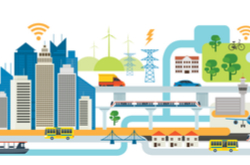Smart urban solutions for more resilient cities
Europe is one of the most urbanised regions in the world, with 73 % of its population living in cities and towns. With the expected rise in global urbanisation in the coming decades, European cities will be facing many challenges associated with sustainable urban development. SMURBS, a new project begun as part of the EU’s ERA-PLANET umbrella project, is working to increase urban resilience and enhance the quality of life in urban regions. To achieve this goal, it’s focusing on challenges related to air quality, urban growth, natural and man-made disasters, health and migration. The SMURBS consortium consists of 19 ERA‐PLANET partners from 12 European countries, including research institutes, space agencies, universities and EO experts. The partners’ considerable and wide-ranging expertise in EO is being refocused in this project to serve the smart city paradigm. Tackling resource fragmentation A major problem in taking effective action is the fragmented nature of the information available. The abundant environmental and EO data currently generated is stored in a wide variety of disparate systems and instruments. These fragmented resources impede the sharing of data and knowledge among stakeholders and policymakers. SMURBS aims to work with selected cities in Europe to bring together and integrate these resources, comprising satellite data, in situ networks and sensors, unmanned aerial systems, models and citizen observatories. The gathered data will be used to produce new information, tools and services that will take into account the needs of citizens and decision-makers. The project’s first step is to stimulate strategic planning by connecting with local authorities, urban planners and city-level stakeholders to map out ‘what is already out there’ and ‘what the users want’. This will be followed by the design, implementation and creation of synergies among EO platforms to meet the predetermined needs. The partners will then create a portfolio of smart urban solutions with tested interdisciplinary products, tools and services for urban planners and decision-makers. The solutions will ultimately be deployed in selected pilot cities, test beds and case studies to demonstrate their cost effectiveness and benefits. With a view to sustainability For any solution to be sustainable in the long term, it must be based on meaningful participation by stakeholders. To ensure such an outcome, SMURBS is holding interviews with high-level decision-makers and conducting stakeholder and citizen workshops. It has also launched a targeted online survey to gather relevant information. The bulk of information received (80 %) has been from public authorities and academic and research institutions from 18 countries and 32 cities, followed by NGOs and the EO private sector. Highlighting the need for such a project, almost 200 institutions have declared a potential interest in SMURBS since its inception only late last year. Centred around smart cities and resilient societies, SMURBS is one of the four strands of ERA-PLANET (The European network for observing our changing planet). The project’s other three strands are focusing on resource efficiency and environmental management, global change and environmental treaties, and polar areas and natural resources. For more information, please see: ERA-PLANET project website
Countries
Italy



